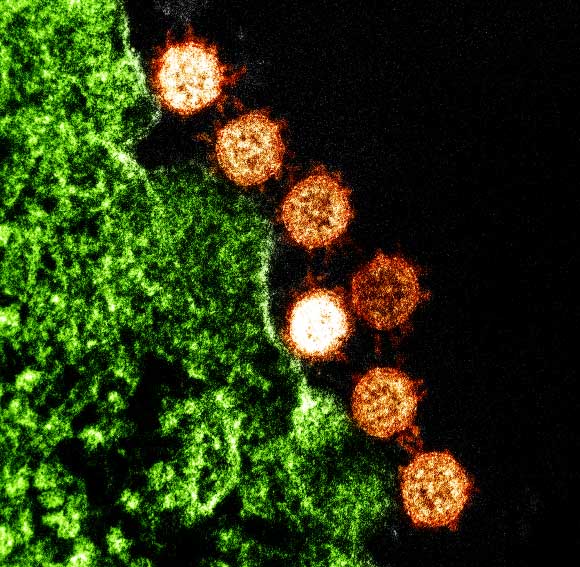Researchers from the University of Alberta and Gilead Sciences, Inc. have discovered that the experimental antiviral drug remdesivir is effective in treating SARS-CoV and MERS-CoV coronaviruses; they expect the drug might also be effective for treating patients infected with SARS-CoV-2, the novel coronavirus that causes the COVID-19 disease.

Colorized transmission electron micrograph of SARS-CoV particles (orange) found near the periphery of an infected cell (green). Image credit: NIAID Integrated Research Facility.
Antiviral drugs for managing infections with human coronaviruses are not yet approved, posing a serious challenge to current global efforts aimed at containing the outbreak of SARS-CoV-2.
Developed by Gilead Sciences, Inc. as a response to the 2014 West African Ebola virus epidemic, remdesivir is a compound with a broad spectrum of antiviral activities against RNA viruses, including SARS-CoV and MERS-CoV.
“Even if you know a drug works, it can be a red flag if you don’t know how it works. It is reassuring if you know exactly how it works against the target,” said Dr. Matthias Götte, a virologist at the University of Alberta.
“We know the drug works against different coronaviruses, like SARS-CoV and MERS-CoV, and we know the novel coronavirus is very similar to SARS-CoV. So I would say I’m cautiously optimistic that the results our team found with remdesivir and MERS will be similar with SARS-CoV-2.”
“Until now, there has not been a published explanation of why remdesivir may work against coronaviruses.”
Remdesivir was first used on a patient with the novel coronavirus earlier this year in the United States.
The patient was given the drug on the seventh day of illness, and showed marked improvement the following day, with symptoms eventually disappearing altogether.
“What our study showed was that remdesivir essentially mimics one of the natural building blocks for RNA synthesis necessary for genome replication of the virus,” Dr. Götte said.
“Enzymes within the virus are synthesizing the viral RNA genome with these building blocks, but they mix up the bits they need with the drug.”
“Once the drug is incorporated into the growing RNA chain, the virus can no longer replicate.”
The next step is to wait for results from ongoing clinical trials with remdesivir, which are expected by the end of April. Even then, that won’t be the end of the story.
“It’s likely we’ll need more than one drug to properly fight emerging diseases like COVID-19, as we have with HIV and hepatitis C virus infections,” Dr. Götte said.
“Ideally, we will have a couple of drugs because certain strains could be resistant to certain treatments.”
The study is published in the Journal of Biological Chemistry.
_____
Calvin J. Gordon et al. The antiviral compound remdesivir potently inhibits RNA-dependent RNA polymerase from Middle East respiratory syndrome coronavirus. Journal of Biological Chemistry, published online February 24, 2020; doi: 10.1074/jbc.AC120.013056







